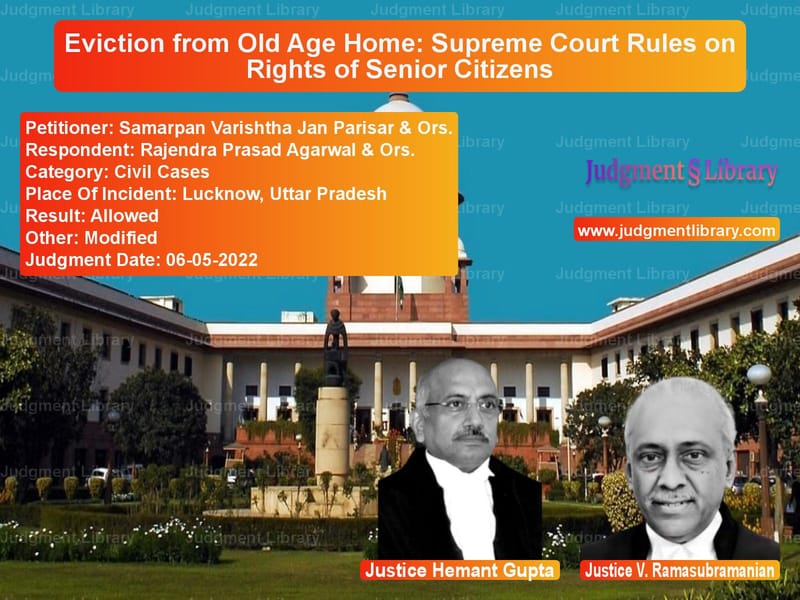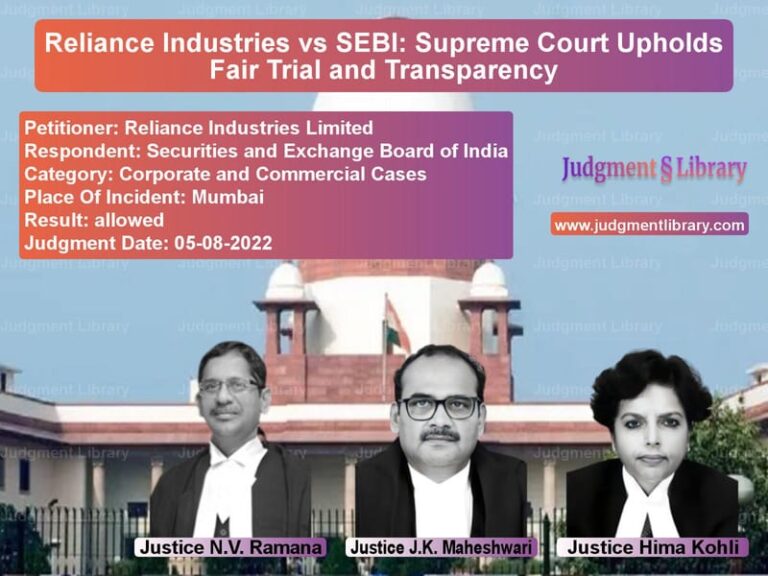Eviction from Old Age Home: Supreme Court Rules on Rights of Senior Citizens
The Supreme Court of India recently delivered a crucial judgment in the case of Samarpan Varishtha Jan Parisar & Ors. vs. Rajendra Prasad Agarwal & Ors., addressing the eviction of senior citizens from an old age home in Lucknow. The ruling clarifies the rights of residents in old age homes, the legal nature of their stay, and the obligations of management in ensuring discipline while respecting human dignity.
The Court ruled that the eviction of senior citizens from an old age home is justified if they violate the rules of the establishment. However, it also directed authorities to ensure alternative accommodations for the evicted residents and mandated regular inspections of old age homes to safeguard the rights of elderly individuals.
Background of the Case
The case involved an old age home named Samarpan, constructed by the Municipal Corporation of Lucknow at Adil Nagar, Ring Road, Lucknow. The appellants were granted a lease to run the old age home for 15 years, with a renewal clause for an additional 15 years. The home was intended to provide shelter, food, and basic medical care to elderly residents.
Respondents Rajendra Prasad Agarwal and another senior citizen were admitted to the old age home in 2016 after signing an agreement to abide by its rules. However, complaints arose regarding their behavior, including allegations of misconduct with fellow residents and staff. The management issued a warning and ultimately terminated their membership, requiring them to vacate the premises.
Aggrieved by the eviction order, the respondents filed a suit for an injunction, which was granted by the Trial Court. The decision was later overturned by the Additional District Judge, but in a revision petition, the Allahabad High Court reinstated the injunction, allowing the respondents to stay in the home.
The appellants approached the Supreme Court, arguing that the respondents had no legal right to continue residing in the old age home after violating its rules.
Key Legal Issues Before the Supreme Court
- Whether the respondents had a legal right to continue residing in the old age home after violating its rules.
- Whether the eviction order issued by the management was justified under the terms of the agreement.
- What role the state and municipal authorities should play in ensuring proper living conditions in old age homes.
Arguments Presented
Petitioners’ (Samarpan Old Age Home) Arguments
- The respondents were admitted as licensees, not as tenants or owners, meaning their stay was conditional.
- The management had the right to terminate their membership if they violated the rules, as per the agreement signed upon admission.
- The eviction was necessary to maintain discipline and ensure the well-being of other residents.
- The High Court erred in reinstating the injunction, as it failed to recognize that the respondents had been offered alternative accommodation by the Social Welfare Department.
Respondents’ (Rajendra Prasad Agarwal & Another) Arguments
- The eviction order was arbitrary and unfair, as they had nowhere else to go.
- The allegations of misconduct were unsubstantiated and based on biased complaints.
- The old age home was built using public funds, making it a public institution where residents should have rights similar to tenants.
- They had acted as whistleblowers, exposing financial irregularities and mismanagement in the old age home, which led to their eviction.
Supreme Court’s Observations and Ruling
1. Residents of Old Age Homes Are Licensees, Not Tenants
The Court ruled that residents of old age homes are licensees, meaning their stay is conditional upon adherence to rules. The ruling stated:
“The respondents do not have any ownership rights or tenancy rights over their rooms in the old age home. Their stay is purely permissive.”
2. Eviction Was Justified
The Court upheld the management’s decision to evict the respondents, citing their repeated violations of rules. The judgment noted:
“If a resident’s conduct disrupts the peace and harmony of an old age home, the management has the right to revoke their membership.”
3. Alternative Accommodation Must Be Provided
The Court directed the state authorities to ensure that the respondents were accommodated in another government-run old age home:
“While the respondents have no legal right to continue staying in the current old age home, they must be provided with an alternative shelter to prevent homelessness.”
4. Regular Inspections of Old Age Homes
The Supreme Court ordered the Uttar Pradesh State Legal Services Authority to conduct regular inspections of old age homes in the state. It directed that:
- Para-legal volunteers must visit old age homes to document complaints.
- The District Legal Services Authority must visit homes at least once a month.
- Authorities should investigate claims of financial mismanagement and ill-treatment of residents.
Impact of the Judgment
This landmark ruling has significant implications for senior citizens and the administration of old age homes.
1. Clear Legal Status for Old Age Home Residents
The judgment establishes that residents of old age homes are licensees, not tenants or owners. This distinction affects their legal rights in case of disputes.
2. Protection Against Unjust Evictions
While management has the right to evict disruptive residents, the ruling ensures that evicted individuals must be provided with alternative accommodation to prevent homelessness.
3. Strengthening Oversight of Old Age Homes
The Court’s directive for regular inspections and legal aid ensures that the welfare of elderly residents is monitored and protected.
4. Encouraging Discipline and Order
The ruling reinforces that rules must be followed in old age homes, ensuring a peaceful and harmonious environment for all residents.
Conclusion
The Supreme Court’s ruling in Samarpan Varishtha Jan Parisar vs. Rajendra Prasad Agarwal strikes a balance between discipline and compassion. By upholding the eviction while mandating alternative accommodation, the judgment protects the rights of elderly residents while ensuring that old age homes can function smoothly. This ruling sets an important precedent for the regulation and administration of senior citizen facilities across India.
Read also: https://judgmentlibrary.com/land-acquisition-and-lapsing-of-proceedings-supreme-courts-verdict/
Petitioner Name: Samarpan Varishtha Jan Parisar & Ors..Respondent Name: Rajendra Prasad Agarwal & Ors..Judgment By: Justice Hemant Gupta, Justice V. Ramasubramanian.Place Of Incident: Lucknow, Uttar Pradesh.Judgment Date: 06-05-2022.
Don’t miss out on the full details! Download the complete judgment in PDF format below and gain valuable insights instantly!
Download Judgment: samarpan-varishtha-j-vs-rajendra-prasad-agar-supreme-court-of-india-judgment-dated-06-05-2022.pdf
Directly Download Judgment: Directly download this Judgment
See all petitions in Property Disputes
See all petitions in Damages and Compensation
See all petitions in Judgment by Hemant Gupta
See all petitions in Judgment by V. Ramasubramanian
See all petitions in allowed
See all petitions in Modified
See all petitions in supreme court of India judgments May 2022
See all petitions in 2022 judgments
See all posts in Civil Cases Category
See all allowed petitions in Civil Cases Category
See all Dismissed petitions in Civil Cases Category
See all partially allowed petitions in Civil Cases Category







